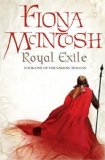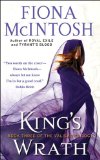In Royal Exile, Fiona McIntosh returns to the same world of the Percheron Saga. Though the concept is exactly what makes for good epic fantasy, the writer’s execution does not bear it out. Wooden dialogue, information dumps, and characters indistinguishable from each other make this novel a sad caricature of its potential.
A tribal barbarian warlord by the name of Loethar is rapidly conquering the Set, a federation of kingdoms with a high medieval culture. The King of Penraven, most powerful of the Set, quickly realizes that he will soon be the last to fall, as each kingdom believed itself capable of stopping Loethar, but with no success. This provides the set-up for the rest of the story, and within a few chapters of its beginning, Loethar has conquered the Set.
But the King of Penraven was canny. He provided for his three children; A daughter who was born on the very day of the invasion is hidden away. The young crown prince and a companion hide in the walls of the castle, and the adopted simpleton is left to the clutches of Loethar.
The first story of this trilogy follows the path of the young crown prince Leo and Gavriel de Vis, both in their teens, who must first hide from Loethar, and then find a way to escape from the castle and begin raising a rebellion.
McIntosh has written a novel that does a lot of telling, but not very much showing. The characters seem to stand stiffly while engaging in discourse, and their actions are known only through declarations of intent. A character will say “I am going to do such and such” and then proceed to do it. Even when it does not come out in dialogue, it seems that internal monologues of the characters announce each action before it occurs, rendering this novel into a prescriptive rather than descriptive tale.
This also come through in the common information dumps, where characters will stop in the middle of an action or normal dialogue to explain some part of the history of the Set. While this is not necessarily a bad thing in fiction, when it occurs as often as McIntosh has done, it begins to become a trial.
Finally, the most grievous error is that McIntosh’s characters are indistinguishable from each other. Her villain does very evil and cruel things, but then will do things that are utterly kind. Her heroes are good and right, but are often petulant, even cruel. There is a case for applauding the attempt to show that peoples’ morality is not all shades of black and white, but rather a more subtle grey. That is, if it is done well. But in Royal Exile it is not done well, and the end result is not more humanized villains or a less noble hero, but simply flat characters who seem to be so much like one another that no interest or emotional connection can be evoked.
This is why, when the love interest of one of the characters is killed in front of the eyes of that character, the reader will feel nothing. There is no level of excitement, no sense of danger. It is a flat recitation of what is happening, and that characters emotions, but we the reader do not feel that we have any connection to the events. It is like reading a work of analytical history, not the popularized works, but the stuff that reminds you of the textbooks of your youth. At times during my reading, I would have preferred to read a textbook. I could applaud McIntosh’s willingness to kill off her characters if I had felt any connection to the characters in the first place, or even if there had been some sort of build-up to the death, rather than less-than-vague hints.
I do not recommend Royal Exile. It is dry and dull, full of flat characters, lackluster narration, info dumps, dialogue with no close relationship to reality, and no rising plot tension. There are much better epic fantasies available and I recommend you try one of them instead. —John Ottinger
FanLit thanks John Ottinger III from Grasping for the Wind for contributing this guest review.
Valisar — (2008-2010) Publisher: The first installment of a thrilling new epic fantasy trilogy from the rising star of the genre. Led by Loethar, an ambitious and ruthless tyrant, a terrifying army of mercenaries and renegades from the great southern steppes threaten to overwhelm the Kingdom of Penraven, having already overthrown its two neighbouring realms, leaving a trail of devastation and broken lives in their wake. Penraven is Loethar’s most desired prize, not only because of its wealth, safe harbour, extensive coastline, and abundant natural resources. This time the tyrant wants more than a crown. Driven by dreams of empire, fuelled by his increasing obsession with magic, Loethar’s plan to overthrow King Brennus of Penraven, 9th of the Valisars, was cemented the hour upon when he learned that Brennus possessed the power of coercion. All of the Valisar heirs have been blessed down the ages with the sinister ability to bend people entirely to their will and Loethar is convinced that if he consumes these empowered people he will then be imbued with their skills and magics! and be unstoppable.


 Royal Exile by Fiona McIntosh
Royal Exile by Fiona McIntosh



Do it! One of the best things I've read in recent years.
This reminds me. I want to read Addie LaRue.
We’re in total agreement David!
I felt just the same. The prose and character work was excellent. The larger story was unsatisfying, especially compared to…
Hmmm. I think I'll pass.